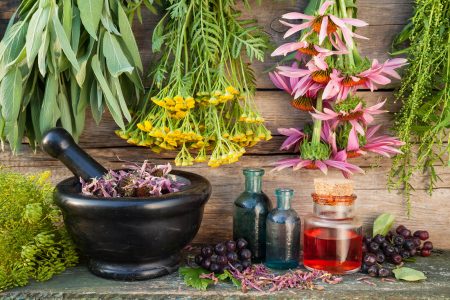Herbal medicines are something I use with every single patient I treat. One herb can multiple beneficial effects and can help support low gradual changes for wellness as well as dramatic shifts in health. Pregnancy and Breastfeeding are no different for the beneficial effects of herbs, we just need to make sure we use the right ones.
Overall most herbs have very high safety profiles and have very little evidence of harm, especially when compared to their pharmaceutical counterparts. The issue with herbs in pregnancy, breastfeeding, and in use with infants is multiple fold – overall herbal research is lacking in our current conventional system, women were long deemed “vulnerable subjects” so less medical research has been done on them, and pregnant women and infants are the most vulnerable of “test subjects” so research on them is few and far between. This is my the majority of herbal and natural health products will say “do not take if you are pregnant or breastfeeding or consultant a health care practitioner”
We must remember though that just because there is not a double blind placebo control trial (gold standard in our current medical research paradigm) doesn’t mean that the herbs are harmful.
Using Herbs in Pregnancy/Breastfeeding
Luckily herbs have been used for generations by multiple types of health practitioners all over the world. This history of usage, in combination with some research that has been done has given us a small list of her
General accepted rules are:
- Minimize intake of medicines (natural and pharmaceutical) during the 1st trimester
- Using herbs and spices in culinary doses is considered safe
- Make sure to know the herbs to avoid (listed below)
- Consult with a licensed herbalist, naturopathic doctor, midwife or integrative medicine practitioner before starting a supplement that isn’t made specifically for pre/post natal support.
Generally Safe Herbs
The following herbs have been shown to be safe for use in pregnancy ** through scientific research:
Cranberry Juice – urinary support
Camomile – relaxation, sleep and nervous system support, calms digestion
Echinacea – coughs, colds and flu, energy support,
Ginger – nausea
Lemon balm – Calming and relaxing, helps with depression, insomnia, thyroid support
Red Raspberry leaf – uterine support, helpful with diarrhea
Oat Straw (Avena) – stress support, high in calcium and magnesium, decreases yeast
Additional Herbs
These herbs all have very very safe profiles and have been traditionally been used with throughout the “natal journey” by herbalists and naturopathic doctors and midwives. It is always best to check in with your health care practitioner before starting a new supplement of any kind during pregnancy
Dandelion leaf and root – high in nutrients especially vitamin A and iron. Support digestion and water retention/swelling
Ashwaganda, Holy Basil, Rhodiola – for stress and anxiety support
Peppermint (as tea or tincture, not essential oil) – for digestive upset in moms and littles!
Herbs to avoid in pregnancy
This is a quick and short list of herbs that can have actions that may have adverse effects during pregnancy including possible abortion and developmental issues.
Aloe (internally), Angelica, Cascara sagrada, Castor oil, Berberine, Buckthorn, Black Cohosh, Hops, Mugwort, Oregon Grape Root, Red Clover, Rhubarb, Tansy, Thuja, Safflower, Scotch broom, Wormwood Yarrow
Essential oils extracts: Thuja, Tansy, Thyme, Oregano, Sage, Peppermint, pennyroyal
In Summary
The spices you are using on a daily basis, as well as the majority of teas, should be fine for you and your growing baby. Well prescribed herbs can be very useful for illness/discomforts of pregnancy often have lower side effect profiles them medications. There are many amazing health care practitioners in our area that can safely and knowledgeably recommend herbs for you – so book an appointment today!
